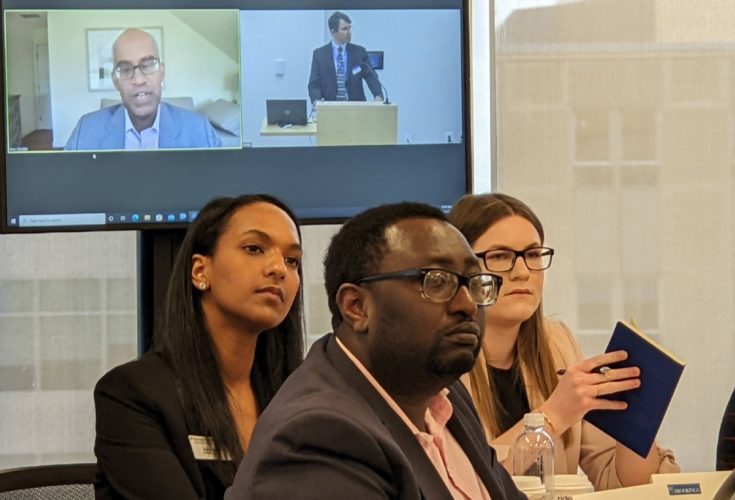This article was originally published in the 2017 Olin Business Magazine.
On a very early spring morning last March, before the tourists could swarm or the business of government could lurch into gear for the day, three dozen Executive MBA students from Olin Business School strolled the quiet hallways of the US Capitol.
The morning Q&A session on the floor of the US House of Representatives—led by a former congressman—marked one of the many stops in an immersive, four-day Washington, DC residency exploring the intersection of business and public policy.
All Olin Executive MBA students (including EMBA Shanghai) are the latest beneficiaries of the unique partnership between Washington University and the Brookings Institution, the highly regarded DC think tank that university benefactor and former board president Robert S. Brookings founded a century ago.
The collaborative relationship is exemplified by Brookings Executive Education (BEE), the “host” of the residencies. Thanks to this insider’s view, students enhance leadership skills by gaining a deeper understanding of how business and public policy mesh—and how they can participate in shaping it.
This behind-the-scenes experience is one Dean Mark Taylor aims to share with every Olin student, capitalizing on the university’s unique relationship with the nation’s premier public policy research institution.
“Our link to Brookings is an incredible differentiator for Olin, with striking opportunities to prepare our students to be well-rounded business leaders,” he said. “We are duty bound to leverage this relationship to its fullest.”
Lessons from the trenches
While in the nation’s capital, students meet congressional leaders, visit foreign embassies, and discuss policy with senior government officials, regulators, and journalists. Overall, BEE’s roster of experts and speakers reads like a who’s who list of Washington movers and shakers, with names such as Marvin Kalb, former Meet the Press host; Carol Browner, former EPA administrator; Ken Duberstein, Ronald Reagan’s White House chief of staff; and former Senate majority leaders Trent Lott and Tom Daschle.
“This is something that is truly quite extraordinary,” said Mary Ellen Joyce, executive director for Brookings Executive Education program. “Other business schools don’t capture this dimension of business operations.”
As Brookings and Olin consider how to expose more students to the partnership, the EMBA residency is seen as something of a model. Bringing large groups of students to Washington requires careful choreography in order to turn Brookings’ deep DC connections into a productive experience.
“The Executive MBA residency has been just a roaring success, partly because we’ve been very, very careful about getting everything just right,” said Lamar Pierce, Olin professor of organization and strategy and director of the school’s Executive Master of Science in Leadership degree program, offered exclusively at Brookings.
Expanding to the Full-Time MBA Program
The expansion of the Brookings-Olin relationship will kick into gear in February 2018, when full-time MBA students from St. Louis will make the DC residency the capstone of their experience.
“This is an order of magnitude more complicated than the EMBA residency,” said Pierce, who will be on hand as two groups of second-year MBA students—70 in each wave—roll into the nation’s capital for a compressed schedule of receptions, roundtables, and Q&A conversations with DC policy makers.
In addition to an appreciation for the policy-making process, students are expected to leave with strategies for how to influence policy through changes in legislation, changes in regulation—even changes in presidential administrations.
“What we hope to do for the MBA students is give them a deeper dive into an area that connects more with their specific area of interest,” Joyce said. “They’ll be long days.”
Creating strong leaders in government
With its founding in the late 1950s, the BEE program was intended to “teach the art of handling problems” to business and government leaders alike. Olin’s Executive Master of Science in Leadership (EMSL) degree meshes well with that mission.
Although the program caters to government employees seeking career advancement, many EMSL students are typically already on top of their game. Pierce said they include high-level administrators in agencies such as the IRS, the Department of Defense, and the Department of Homeland Security—“the people who make sure things get done.”
At any one time, as many as 70 EMSL students are enrolled, dipping into BEE’s flexible schedule of courses as their work schedules permit. BEE faculty tailor case studies to students’ government experience, with students writing papers outlining how they apply classroom concepts to their professional duties. Since launching in 2011, the program has about a dozen EMSL graduates, Joyce said.
“The impact Olin content is having on federal government is incredible,” Joyce said. “We are transforming the federal government one leader at a time.”









